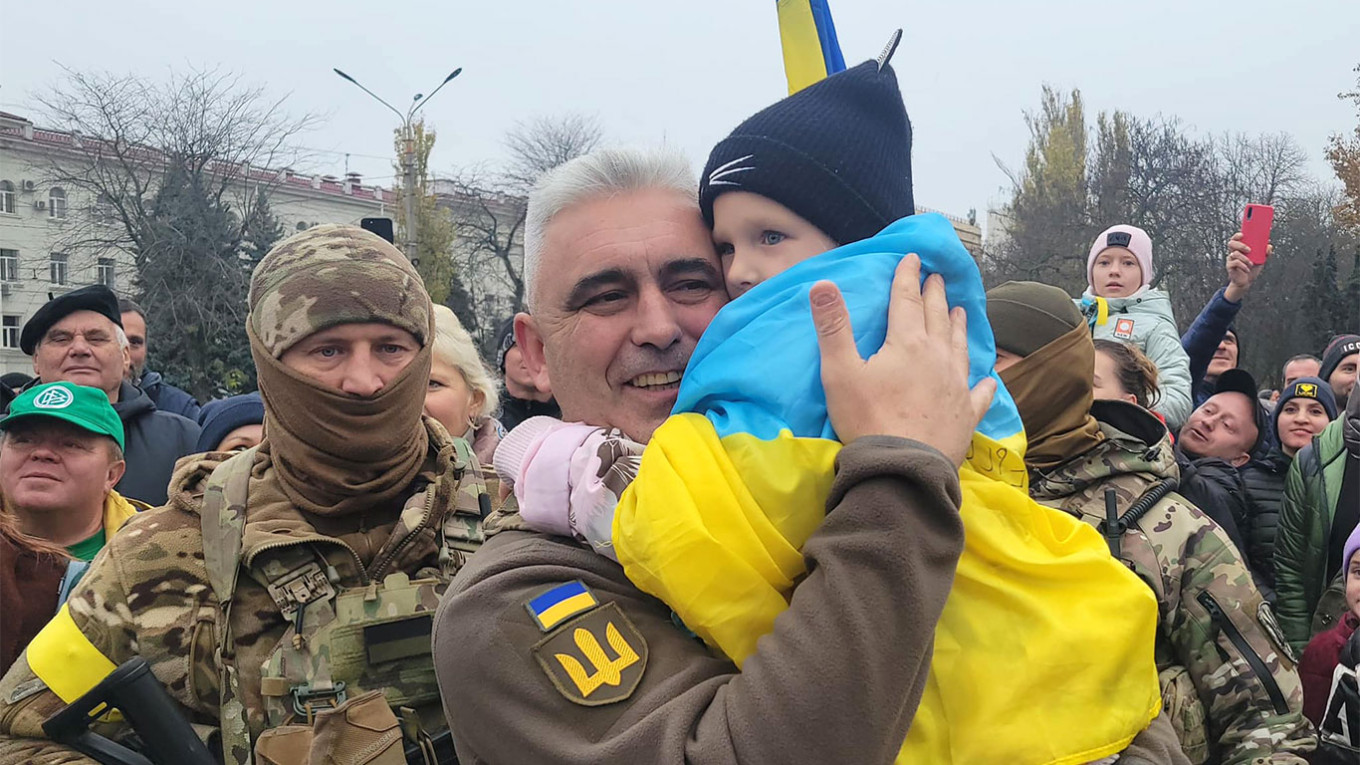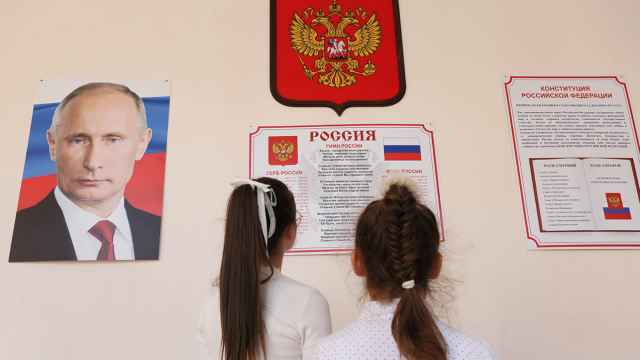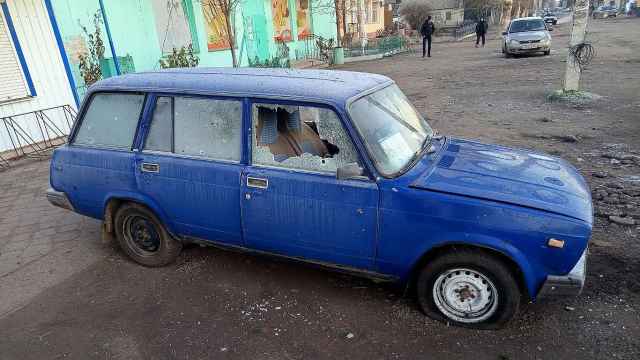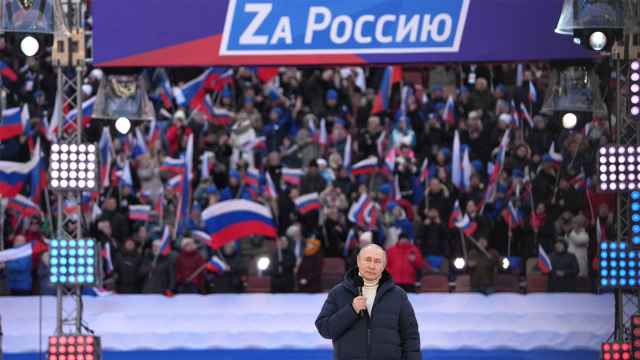Russian troops withdrew from the right bank of the Dnipro River on Friday in a major military defeat for the Kremlin that led to scenes of jubilation in the port city of Kherson, the only Ukrainian regional capital Russia succeeded in occupying in almost nine months of bitter fighting.
Unlike recent Russian retreats in eastern Ukraine, the pull back from Kherson appeared to take place in relatively good order, with the Antonivskyi Bridge over the Dnipro blown up overnight and infantry seen walking across pontoon bridges in the early hours of the morning.
“Today is the happiest day for me! I haven’t closed my eyes for 24 hours,” said one Kherson resident, who requested anonymity to speak freely.
"There's nothing better than watching russkies on their knees," she told The Moscow Times.
The full withdrawal of Russian forces came less than 48 hours after Defense Minister Sergei Shoigu ordered the retreat on live television. The retreat amounted to one of the Kremlin’s biggest battlefield reversals since it launched its full-scale invasion of Ukraine at the end of February.
Photos and videos emerging from Kherson and the surrounding region showed Ukrainian flags being raised over administrative buildings, cars sounding their horns, pro-Russian posters being torn down and locals welcoming the arriving soldiers. Several people were seen weeping with joy.
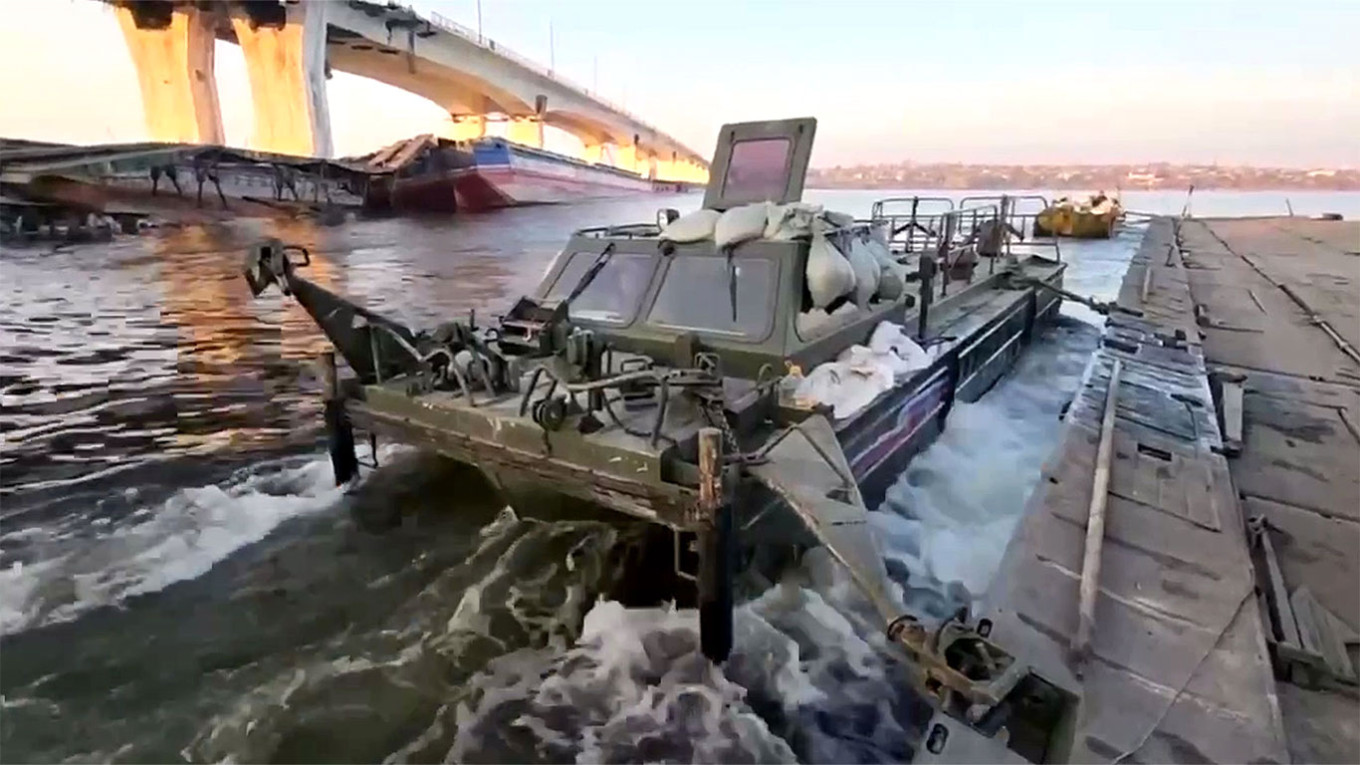
The recapture of Kherson was hailed by Ukrainian Foreign Minister Dmytro Kuleba as an “important victory” that proved “whatever Russia says or does, Ukraine will win.”
While President Vladimir Putin has not publicly commented on the retreat, his spokesperson Dmitry Peskov told reporters that Kherson was still Russian territory as a result of Moscow’s annexation of four regions of Ukraine in September.
“It is a subject of the Russian Federation. There are no changes in this and there cannot be changes," Peskov said.
In recent days, Kherson city has suffered major disruptions to electricity and water supplies, with many unable to access the internet or mobile networks, relatives and friends of those living in the city told The Moscow Times.
The city, which had a pre-war population of almost 300,000, has been the focus of a months-long Ukrainian military campaign that has seen Kyiv’s forces attack Russian supply lines across the Dnipro, making the position of Russian forces on the right bank increasingly tenuous.
While there were few details of exactly how the Russian Armed Forces carried out their rapid pull back, the military maneuver appeared to have been prepared well in advance of the official announcement of the withdrawal Wednesday.

“From what we know so far, it seems the retreat was a well-designed series of fall backs,” said William Alberque, a military and arms expert at the London-based International Institute for Strategic Studies.
The Russian Defense Ministry said in a statement that it had evacuated some 30,000 troops and 5,000 pieces of equipment across the Dnipro River. But pro-Kremlin journalist Alexander Sladkov estimated the figures to be much lower, writing on Telegram that the true numbers were, respectively, 20,000 and 3,500.
Unlike significant Russian retreats in the eastern Kharkiv region and the loss of strategically important cities such as Lyman and Izyum in the fall, the evacuation of men and material from Kherson appears to have been relatively well-organized.
“Today at 5 o'clock in the morning Moscow time, the transfer of Russian troops to the left bank of the Dnipro River was completed,” the Russian Defense Ministry said in a statement published on Telegram.
“There was no loss of personnel, weapons and military equipment.”
While there was no evidence of panic among Russian troops, military analysts doubted that the retreat was carried out without incident.
“It is very unlikely that Russia didn't lose men or material,” Nick Reynolds, an analyst at London’s Royal United Services Institute, told The Moscow Times. “Militarily, a retreat is one of the most difficult things a military can do. To break contact and withdraw in good order is very risky.”
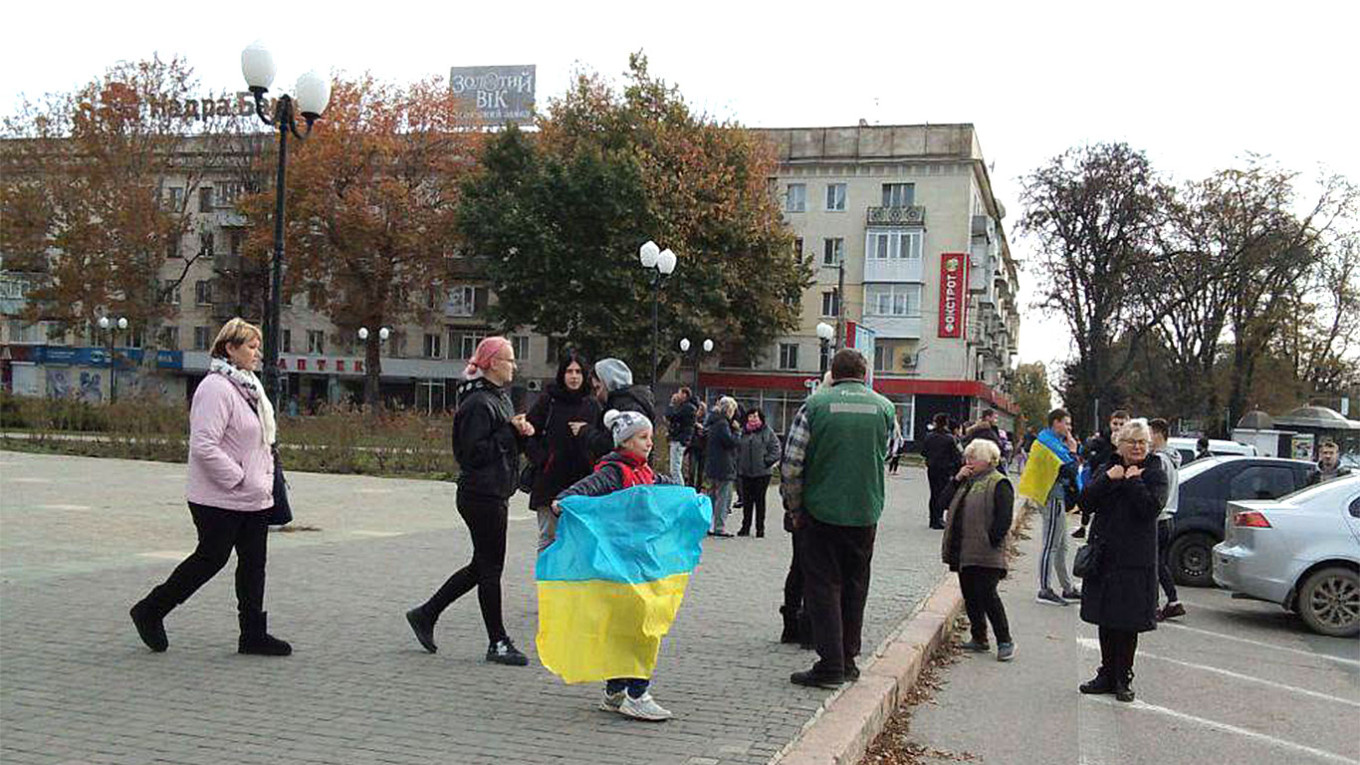
“Ukraine did catch portions of the [Russian] forces with longer range artillery and it does appear that some units were relatively abandoned,” said Alberque, pointing to satellite images that appeared to show Ukrainian forces had managed to inflict damage on withdrawing units.
The first major urban hub to be seized by Russia after its invasion on Feb. 24, Kherson ended up being Ukraine’s only regional capital to fall.
Its recapture is not only a major symbolic blow to Putin, but it opens a gateway for Ukrainian forces to attack the rest of the Kherson region, which extends to the Black Sea, which if successful would disrupt the land bridge that links the Russian mainland to the Crimean peninsula, which was annexed by Moscow in 2014.
While the retreat has been downplayed by state-run Russian media, two senior Russian officials, who requested anonymity, told The Moscow Times that the loss of Kherson could have serious repercussions within the military and the Russian elite.
“I won’t try to downplay. It is a big challenge,” said one official in the Russian government.
“This is a very bad situation for us,” said a Foreign Ministry official who used to be involved in negotiations with Ukraine.
“The question is, what else can we leave behind? What is the military plan and what is our goal? The system [of government] has not yet felt the failure in Kherson. But the constant ambiguity and lack of communication… raises many depressing questions.”
The Dnipro River will be a major obstacle for Ukrainian forces hoping to continue their advance, with Russian soldiers reported to have been digging in on the left bank and preparing defensive positions for weeks.
Some analysts said that the destruction of the Antonivskyi Bridge suggested Russian commanders were worried Ukraine might be in a position to sustain their momentum.
“[Russia] may be concerned that they don't have a solid defensive line on the other side and Ukrainian forces may come after them,” said Alberque.
“I think Russia is worried about pursuit.”
A Message from The Moscow Times:
Dear readers,
We are facing unprecedented challenges. Russia's Prosecutor General's Office has designated The Moscow Times as an "undesirable" organization, criminalizing our work and putting our staff at risk of prosecution. This follows our earlier unjust labeling as a "foreign agent."
These actions are direct attempts to silence independent journalism in Russia. The authorities claim our work "discredits the decisions of the Russian leadership." We see things differently: we strive to provide accurate, unbiased reporting on Russia.
We, the journalists of The Moscow Times, refuse to be silenced. But to continue our work, we need your help.
Your support, no matter how small, makes a world of difference. If you can, please support us monthly starting from just $2. It's quick to set up, and every contribution makes a significant impact.
By supporting The Moscow Times, you're defending open, independent journalism in the face of repression. Thank you for standing with us.
Remind me later.





